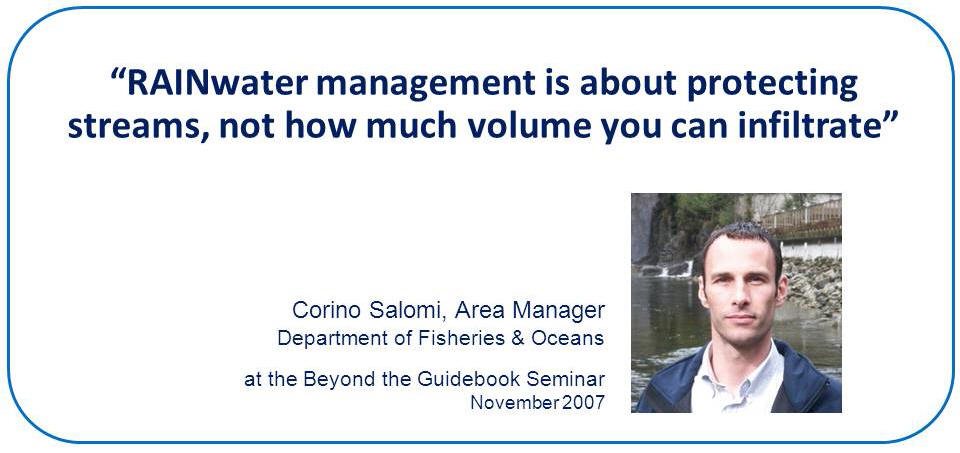Sustainable Rainwater Management on Vancouver Island: What Does It Look Like?
On March 28, the Cowichan Valley is the host region for the 2nd Vancouver Island Water Balance Model Forum. To download an Agenda Preview, click here. The 4-hour Forum is structured in a way that is designed to facilitate inter-active knowledge-transfer. At the start of each hour, context presentations by those who are leading changes in practice will inform “sharing and learning” in a town-hall format
The Goal: Protect Stream Heath
Land development practices and actions at the site scale can result in either impacts or benefits at the local and watershed scales. The “Water Balance Methodology” holds the key to protecting stream health because it accounts for all the rainfall-days in a year. This methodology is a foundation block for those tasked with developing an Integrated Stormwater Management Plan (ISMP).
The web-based Water Balance Model for British Columbia (WBM) is a scenario comparison tool. Launched by an inter-governmental partnership in 2003, the tool quantifies the effectiveness of green infrastructure in accomplishing two inter-connected goals: reduce a community’s ‘water footprint’; and protect stream health.
In 2011, the Water Balance Model was rebuilt on a new platform. It is quicker and cleaner to use; and it now has launch buttons at three scales of investigation; SITE, NEIGHBOURHOOD and WATERSHED.
To Learn More:
To read an article about the “made in BC” approach that was published in Stormwater magazine in November 2011, click on Rainwater Management in a Watershed Context – What’s the Goal?
For background on the article, click here to read a story posted elsewhere on the Water Bucket website.
Water Balance Model Outreach
In conjunction with the re-build, the WBM Partnership is implementing an outreach, education and training program. This program builds on the experience gamed over the past decade in pioneering a practitoner-based approach that is founded on collaboration with local government.
Inter-Regional Education Initiative
“In 2008, the Cowichan Valley was the first demonstration region for the initial rollout of Living Water Smart, British Columbia’s Water Plan, and also hosted the inaugural  Vancouver Island Water Balance Model Forum. On March 28th, the Cowichan Valley will again host a WBM Forum. Our venue is a LEED facility on the Duncan campus of Vancouver Island University,” reports Kate Miller of the Cowichan Valley Regional District. Kate is Manager of the Regional Environmental Policy Division; and is currently integrating rain, storm and stream management at multiple scales in the region using a ‘design with nature’ approach to infrastructure.
Vancouver Island Water Balance Model Forum. On March 28th, the Cowichan Valley will again host a WBM Forum. Our venue is a LEED facility on the Duncan campus of Vancouver Island University,” reports Kate Miller of the Cowichan Valley Regional District. Kate is Manager of the Regional Environmental Policy Division; and is currently integrating rain, storm and stream management at multiple scales in the region using a ‘design with nature’ approach to infrastructure.
“The Forum is the kick-off for an Inter-Regional Education Initiative to be implemented in four regions over several years. Sharing of experiences, collaboration, alignment and a consistent approach on Vancouver Island will allow everyone to go farther, more efficiently and effectively.”
“Five local governments comprising the Cowichan Valley Regional Team will report out on how each has progressed since 2008. Our emphasis will be on “targets and criteria”, lessons learned, and practices necessary to protect stream health. Regulatory agencies and other local governments will also be sharing their insights at the WBM Forum.”
Methodology Links Rainfall to Stream Health
“WBM Partners understand that the water balance methodology links rainfall to streams, and this is how we will protect our streams. It is all about maintaining the natural balance and speed of water in (or on) and out at the site level and for the watershed.”
“This means properties, streams and the watershed are protected from unnatural runoff volumes and erosive forces. This also means that the community’s infrastructure, whether man-made or natural, can accommodate the volumes it was designed for without causing damage,” concludes Kate Miller.
To Learn More:
In November 2011, the Partnership for Water Sustainability in British Columbia released two guidance documents that support the Water Balance Model Outreach Program, namely:
- Primer on Rainwater Management in an Urban Watershed Context
- Primer on Urban Watershed Modelling to Inform Local Government Decision Processes
The Primers provide engineers and non-engineers with a common understanding of how a science-based approach to rainwater management has evolved since the mid-1990s. The Primers also provide guidance in three areas: setting performance targets, defining levels-of-service, and application of screening / scenario tools.
Click on the image below to download the AGENDA PREVIEW for the 2012 Vancouver Island Water Balance Model Forum.




